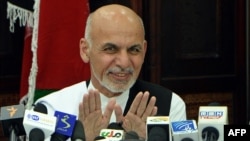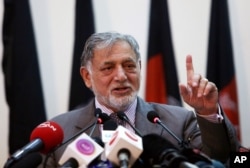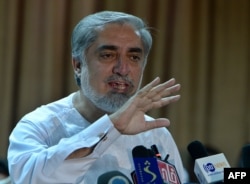Preliminary results from last month's (June 14) Afghan presidential runoff vote indicate former finance minister Ashraf Ghani is well ahead of his rival candidate Abdullah Abdullah, who topped the first round of voting.
The results were supposed to be announced last week but recounts at nearly 2,000 polling stations where fraud was alleged forced the Afghan Independent Election Commission to delay them for few days.
Even on Monday, journalists had to wait for several hours before Commission chief Ahmad Yousuf Nouristani arrived to declare the results. He said that more than 8 million Afghans voted in the runoff election and that over 56 percent of the tally went to Ashraf Ghani while his rival Abdullah Abdullah received approximately 44 percent.
Fraud acknowledged
However, the chief election commissioner cautioned against drawing any conclusions at this stage.
Nouristani said "the announcement of preliminary results does not mean that the leading candidate is the winner", adding that "probe into [rigging] complaints might change the outcome."
He acknowledged that vote fraud took place, saying that even “some governors and government officials” were involved in it. Nouristani promised to conduct a wider probe before announcing final results, which are due later this month (July 22).
Abdullah refuses to accept any results until the election commission invalidates all “dirty votes” and has claims to have received majority of the “clean votes”.
His representatives have been talking with Ghani’s team to agree on a comprehensive audit of polling stations where rigging allegedly took place. But the negotiations have apparently failed to defuse political tensions stemming from allegations of what Abdullah says “industrial-scale fraud.”
The U.S. State Department weighed in on the early results saying, "Serious allegations of fraud have been raised and have yet to be adequately investigated," adding that the final election results could change.
Caution urged
The director of the privately run Election Watch Organization of Afghanistan, Jandad Spinghar, said that unless the two candidates found a peaceful political solution to the disagreement, Afghanistan may witness violent protests in the coming days.
“If political negotiation goes well among both candidates or they reach agreement on some sharing [of] power in the future, it might be the only solution to stop that conflict. Otherwise [the] potential for conflict is much [very] high in the current situation,” said Spinghar.
The winner of the election will replace President Hamid Karzai, but the political controversy has dashed hopes for a smooth transfer of power from one elected government to another - the first in the history of Afghanistan. Abdullah alleges that Karzai’s administration has played a role in rigging the vote in favor of Ghani, charges the president’s office rejects.
Ghani, a former World Bank-official, also dismissed allegations his lead in the race is the result of fraud vote. He said he wanted the democratic process to be completed sooner rather than later to end political and economic uncertainty griping Afghanistan.
An early resolution to the dispute is considered vital at a time when most foreign troops are preparing to withdraw from Afghanistan by the end of the year, while Taliban insurgents have stepped up attacks round the country. A bilateral security agreement between Kabul and Washington is awaiting the signature of the new Afghan president that would allow around 10,000 American soldiers to stay in the country until the end of 2016.
Spike in violence
Meanwhile, Taliban insurgents remain a formidable security risk after vowing to disrupt the election process.
On Monday, insurgents in northern Afghanistan fired a rocket into a home killing five children.
In a separate attack Monday gunmen killed five policemen in the western province of Herat.
Afghan President Hamid Karzai condemned the attacks. “The killing of civilians, especially children, is an inhuman act and against Islam,” he said.
Analysts believe the contentious election has encouraged the Taliban to step up their attacks.






